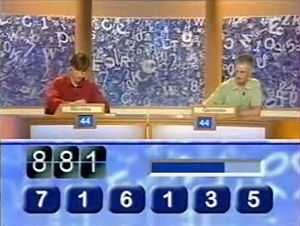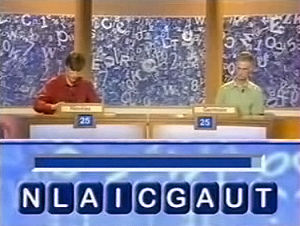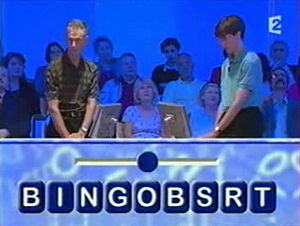Due to persistent vandalism, account creation has been suspended. If you would like an account, please contact Charlie Reams on Apterous.
Des chiffres et des lettres
Des chiffres et des lettres (literally "numbers and letters") is a French television programme which ran from 1972 to 2024. It was created by Armand Jammot and tests the numeracy skills and vocabulary of two contestants. It has aired over 10,000 episodes, and it the longest-running show broadcast on French television. It is notable in the UK for being the original version of Channel 4's Countdown.
The game debuted in 1965 with letters only, under the name Le Mot Le Plus Long (The Longest Word), before numbers were introduced in 1972. It is broadcast on France 3 and is currently presented by Laurent Romejko, Blandine Maire and Stéphane Crosnier (the latter two check the existence of the words proposed by the contestants; Crosnier also provides solutions to the number problems that the contestants fail to solve). The show is also seen throughout the world on TV5.
In 2024, it was announced that production of the show had ended, two years after merging from airing on weekdays to weekends two years prior in 2022.
Contents
Rules
Two contestants play against one another.
As the title of the game indicates, it is based on two skills: numeracy rounds and letters rounds.
In the television version, there are also "duels". These are speed problems for which only the first player to provide the correct answer receives points. Both contestants may receive points in solving the other problems.
Up to 2016, the winner of a match is the first player to win two games (manches, literally innings) out of three or a player who wins the opening game by 40 points or more.
Each show is made up of 14 problems presented in five sections. The first, second, fourth, and fifth sections consist of one number problem followed by two letter problems. The third round consists of five duels. If the players are tied at the end of the program, a buzzer question is used to break the tie.
Le compte est bon ("the total is right")
The goal of this round is to arrive at a chosen number (from 101 to 999) using the four basic arithmetic operations (+, −, × and ÷) applied to six numbers chosen randomly from the following alternatives: 1 to 10; 25; 50; 75; 100 (each number is drawn from the entire set, so the same number may appear more than once). Once these six numbers are selected, a three-digit target number is generated. The players combine the numbers arithmetically with the goal of producing the target number. The contestants may use each of the six numbers originally selected once, and the result of each operation performed with them once – for example, if a contestant multiplies 4 by 25 to obtain 100, he or she may no longer use the 4 or 25, but may use the 100 in further calculations. All numbers used must be integers.
| Rnd | Selection | c1 | Score | c2 | Others | Max. |
|---|---|---|---|---|---|---|
| 8 4 4 6 8 9 → 594 | – |
Best: 594 = (4 × (8 + 8) + 2) × 9 |
Contestants signal that they have obtained the target number by saying le compte est bon. Nine points are awarded to each contestant who arrives at the target number exactly. If neither contestant obtains the target number, the contestant or contestants with the result nearest the target number receive six points each.
Le mot le plus long ("the longest word")
In this round, contestants alternately selected a vowel or consonant (each chosen unseen from all possible vowels or consonants) until ten letters have been chosen. Contestants took turns specifying whether the next letter will be a vowel or a consonant. Specific letters may be selected multiple times. Since the show's revamp in September 2016, one contestant is now simply asked to select the number of vowels they wish to be used in the round, and the selection is randomly generated.
The goal is to find the longest word using the available letters. The contestant with the longest word scores the number of letters in the word; both contestants get points if there is a tie. If a contestant tries a longer word that is not in the programme's dictionaries, his or her word is rejected, but his or her opponent may score the number of letters originally claimed with a shorter word. For example, if a contestant produces a nine-letter word that is rejected and his or her opponent produces an acceptable word that is shorter, the opponent gains nine points.
Example
- With the following letters:
TOCEDAMITQ
it is possible to get the French words coeditat and decotait.
- With the following letters:
RURETECURE
it is possible to get the French word recruteur.
Duels
In an episode of DCeDL, there are four duels which could be selected from these:
- "Duel traditionnel" ("traditional duel"): the classic version, which consists of finding two words on the same theme after 10 letters have been given, e.g. RAAUBITIAH, with the clue "Iles des Caraibes" ("Caribbean islands"). The solution is ARUBA and HAITI.
- "La bonne orthographe" ("correct spelling"): a word is proposed and the winner is the one who spells this word correctly, e.g. LABYRINTHIQUE.
- "Le calcul mental" ("mental arithmetic"): the players must complete a calculation with 5 operations in their heads, e.g. (15 × 15 − 90) ÷ 9 × 75 + 115.
- "L'un dans l'autre" ("one within the other"): with ten given letters, find a 10-letter word and another word, within the first; one a proper noun, the other a common noun, fitting with the clues given, e.g. NIOKTEGNSN with the clues "Palais et quartier Londonien" ("Palace and London borough") and "Religieuse" ("Religious"). The solution is KENSINGTON and NONNE (nun).
- "Sprint chiffres" ("sprint numbers"): a numbers game, where a candidate must provide an exact solution with the given selection as quick as possible.
- "Double-sens" ("double meaning"): two different clues for a homonym are given and contestants may see the amount of letters in the mysterious word after the countdown starts.
- "Trois-en-un" ("three in one"): one clue for a nine-letter word is given and one of its letters shows up after the countdown starts, a second random letter will appear after 10 seconds and a third after 20 seconds.
Only one answer is accepted, from the first player to provide one. If the answer is correct, 10 points are awarded to the player giving it. If the answer is incorrect, the player's opponent receives 10 points. If nobody buzzes, nobody scores.
If contestants' scores result in tie, both are participating in another duel, which strongly resembles the "conundrum" in the UK version: 10 shuffled letters are given and contestant who buzzes must provide a single 10-letter word which could be made out of them.
Before the regular letters and numbers rounds, a toss-up duel is played, with the winner earning a "sesame", or joker, that can be used in the final bonus game "Le mots de la fin".
Les mots de la fin ("the last words")
This round was introduced in 2016 along with a new set for the show. Only the winning contestant plays this round. S/he has two minutes to find the longest word from 8 different 10-letter selections as possible. Each correct answer is worth €100. The longest word is either 7, 8, 9 or 10 letters long and the maximum word length is indicated in each selection. The contestant may pass and move on to the next selection, and the selections are cycled until the time expires or all eight have been solved. If player had earned joker in the start of show, s/he can say "sesame" and earn €100 for passing a difficult selection. Although, a player can give all 8 words in time, and unused joker transforms in to additional €100, which means that a finalist can win €900 for the perfect game.
Since 2022 the rules are slightly changed: if the player got to the Final round for the 1st, 2nd, 3rd, 4th or 5th time, s/he will play an "easy themed" version of the game where all words are connected by a certain category (e.g. "In space" or "Office supplies"). Although, the player will earn only €50 for each correct word and can't exchange joker for additional money. If the player got to the Final round for the 6th, 7th, 8th, 9th or 10th time, the player will play a classic version of the game with different and difficult words to guess, but the player receives €100 for each correct word and s/he can exchange joker for passing a difficult selection and get the additional €100. Also, having joker allows the player decide which version of the game (easy or classic) s/he wants to play.
Comparison with Countdown in the UK
The format is similar to the English version. Currently there are 14 rounds, which are identical to the rounds used in the 14 round format of grand finals up until Series 46 when the 15 round format was brought in, though the 14 rounds are not in the same order. Since September 2016, the show consists of two sections: Classic rounds (alternating Letters Rounds and Numbers Rounds) and Duels. Other notable differences are:
- When one player has a longer word than the other player, only the player with the longer word gives his/her word.
- Contestants are now asked how many vowels they would like to be used in a letters selection, to speed up the game. This rule replaced the alternating vowel and consonant selection in September 2016, when the show was also given a completely new set.
- Instead of conundrums, there are duels, which involve some sort of mental calculation or anagramming feat (but not simply a 9-letter anagram).
- Players get 9 points for a 9-letter word and not 18.
- Player, who provides a word which is longer than competitor's, may get 2 bonus points if s/he can provide another word with the same or bigger length of letters. Also, 2 points are awarded automatically if the player's word is the only longest word possible. It means that player can get 12 points in single round, if s/he provides an only 10-letter word possible and her/his competitor doesn't.
- A correct numbers game scores 10 points; if neither player has it spot on, whoever is nearer gets 7 points, no matter how far away the solution is from the target. If the target is unachievable with a given selection, contestants may get 10 points for providing the closest possible solution.
- If the player declaring a longer word offers an invalid word, the opponent gets as many points as that player was trying to win (for example, if a player proposes a wrong 8-letter word, his opponent wins 8 points even if he only had a 7-letter word).
- Players don’t get to choose how many large and small numbers, they are drawn at random from a single set.
- Players need to win 10 games in order to be an unbeaten champion and not 8. Contestant gets a good prize from sponsor for winning 5 games and even better prize for winning 10 games.
Very few people have appeared on both the French and British versions; among them are Pierre Sandrini, Tricia Pay and Jeff Clayton. Pay and Sandrini both reached the quarter-finals on Countdown, while on Des chiffres et des lettres, Pay lost her first game and Sandrini was undefeated. Clayton won 2 out of 3 games on Countdown during his first run, and achieved the reverse on Des chiffres et des lettres.
See also
- Des chiffres et des lettres on Wikipedia
- Des chiffres et des lettres on the French language Wikipedia
- Cifras y Letras, Spanish version
- Cijfers en Letters, Dutch version


